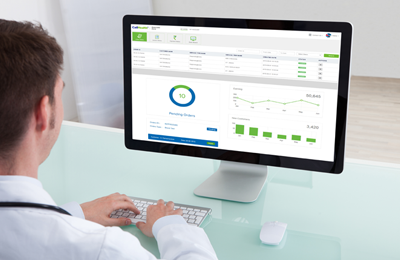
One of the key services in the CallHealth portfolio is eConsultation, where you play a critical role.
eConsultation enables a patient to consult a doctor from home via phone or video call. A trained and qualified CallHealth Mobile Health Officer is physically present to perform all assessment tests as directed by the doctor.
Expanded Geographical
Reach
Since we recommend you to our customers, you can expect a higher inflow of patients and an increased business opportunity with zero additional investment.
Access to
Support Staff
Our Call Centre Officer captures basic customer details and medical history to save you time, while an MHO is present with the patient during eCosultation to carry out any tests you require.
New Age
Consultation Tools
Industry's first virtual whiteboard, to explain the disease/ailment to your patients by offering access to over 1000 images and videos.
Zero Additional
Investment
You can increase your practice and reach with no extra investment.

In a typical eConsultation cycle, there will be about three interactions which include an initial symptom assessment, physical assessment consultation and post diagnostic test evaluation/treatment recommendation. In all, an eConsultation cycle entitles a patient to 3 interactions with the Doctor or a 7 day coverage, whichever is earlier. The doctor enrolled with us will need to be available for all the interactions.
To determine the most appropriate doctor for the customer as per symptoms and requirements, and to ensure fair distribution across our enrolled specialists, we have developed a technology driven Selection Rule Engine. The fundamental rule is that the choice of the customer determines the Associate Specialist he consults with. If CallHealth were to recommend, then the Selection Rule Engine applies its selection criteria to arrive at the Most Appropriate Service Associate (MASA).
The technology driven CallHealth Selection Rule Engine (SRE) determines the Most Appropriate Service Associate (MASA) as per customer requirements and/or on the basis of fair distribution principles. The filtration process involves applying a set of rules to the universe of CallHealth associates in order to arrive at the MASA.
CallHealth deals with various categories of associates including Hospitals, Specialists, Diagnostic Centres, Imaging Centres, Fitness Centres etc. Hence we have defined a general set of rules, which are then customized and applied to each associate category if applicable.
The Rules applied used by CallHealth are as below:
RULES APPLICABLE FOR ASSOCIATE CATEGORY - DOCTORS/SPECIALISTS:
For associate category specialist, the rules given below are applicable. These rules are applied for filtration in descending order.
The rules of Cost and Reach are not applicable for associate category - specialists, due to reasons described in Annexure B.
This filtration process is depicted visually on page 2

ANNEXURE A
Definition of Rules:
1. SERVICEABILITY:
(i) An Associate Specialist should have the service sought by the customer in its portfolio of services.
Example: If the customer requires Gynecology Specialization and if a particular specialist is not specialized in, then the Associate will be regarded not capable of servicing the client. The Serviceability filter will filter-out that Associate Specialist in determining an Associate for that customer.
(ii) An Associate Specialist should speak the language of preference of the Customer. Example: If the customer requires the consultation to be in 'Telugu' language and if a particular specialist cannot speak 'Telugu' then the Associate will be regarded not capable of servicing the client.
2.COST: Not applicable for this class of associates, since we are currently offering standard rates to the customer for consultation
3.REACH: Not applicable for this class of associates, since we are offering Virtual Consultation.
4.AVAILABILITY: This is about a service being available at the required point in time. Example: If a customer wants to consult on a specified day and time, the rule of the specialist being available at that time for consultation should be fulfilled.
5.CUSTOMER RATING: CallHealth encourages customers to rate their service experience with respect to each associate specialist. Weighted averages of those doctors are used while guiding the customers when they seek help in making a choice.
6.FAIR DISTRIBUTION: This criterion is about selecting a single Associate Specialist from the Fair-Distribution-Set (FDS) as per Proportionality Principle (PP).
ANNEXURE B
How the Services Rule Engine (SRE) works
A. Customer Choice: The first and the most fundamental rule is that the choice of the customer - if he chooses to exercise it - determines the Associate Specialist he consults with.
B. Waterfall Method: The number of 'Potential Associate Specialists' keeps shrinking as the filtration happens from rule 1 to 4 in that order. For example, the 'serviceability criterion' shortlists potential specialists basis the specialty required by the customer and the language preference of the customer. Also these rules are our general filtration rules and some rules may not apply to some categories of associates. For example, the next rule criterion - 'cost', is not applicable for the associate category of specialists, since currently CallHealth offers standard consultation rates to the customer. The shortlisting process continues till rule four.
C. Customer Seeking Guidance (CSG): Rule number five is about the customer seeking guidance and wanting to make an informed choice. Remaining Associate Specialists after applying rules 1 to 4 are ordered based on General Customer Ratings (GCR).
In case the customer has used one of the Associate Specialist services earlier, he would be first asked if he wants to choose the same doctor. Should the customer ask for an alternative, three top rated Associate Specialists are then presented to the customer for a choice to be made. Customer would be presented with the next three rated Associate Specialists and more if the first three are not sufficient.
Example: Say, the total number of Associate Specialists (the number of Specialists CallHealth has relationship with) is 100 in Hyderabad. After applying filtration procedures from rule 1 to rule 4, let us say, that the number comes down to 7. As per CSG rule, these specialists are ordered from 1 to 7 based on customer ratings. The highest-rated-Associate-Specialist, say the one that is rated 4.5 on a scale of 5.0, gets ranked as number one. The least rated doctor, say the one that is ranked 3.6, gets ranked as number 7.
We are just launching our services and generation of statistically valid customer ratings will take some time, till we have a certain minimum number of customers who have rated an associate. In the interim, the selection and ordering of 3 hospitals after applying rules 1-4 will be done by the system on a random basis.
When the customer is unable to make a choice or when he explicitly asks CallHealth to make a choice, the Most Appropriate Service Associate (MASA) will be selected from the Fair Distribution Set (FDS) following Proportionality Principle (PP).
D. Fair-Distribution-Set (FDS): When the customer leaves the choice to CallHealth, selection is made out of the limited Associate Specialists left after applying rules 1 to 5, called the Fair-Distribution-Set. Generally speaking, FDS covers only those instances where the customers have not made a choice by themselves.
Example: While the total number of Associate Specialists of CallHealth may be 100, after applying filtration rules 1 to 5, the FDS Associate Specialists for a given transaction may be only 7.
E. Proportionality Principle (PP): The computer system automatically records the time of selection of Associate Specialist for the customers. Therefore, the computer system is aware of the last selection times of each of the members of the FDS that resulted in serving a customer. Each eligible member in the FDS is sorted based on its last selection time in a chronological order (earliest to recent with earliest at the top) and PP follows a simple method of selecting the Associate Specialist that is at the top of this chronologically sorted list. Proportionality Principle follows a simple method of selecting an Associate Specialist that served its Last-FDS-Customer- Earliest (LFCE).
Example: If Associate Specialist 'A' served Last-FDS-Customer at 3pm yesterday, 'B' at 10am yesterday and 'C' at 11am today, 'B' gets selected because it served the Last-FDS-Customer-Earliest. It is to be noted that the customers that were served by the Associate Specialists as chosen by the customers directly are disregarded for the purpose of applying Proportionality Principle.
F. Most Appropriate Service Associate (MASA): The Selection Rule Engine (SRE) always selects a single Associate Specialist driven by the rules and principles stated above. As the SRE is mostly driven by technology, there is minimal time and effort on the part of the Call Centre Officer (CCO) in gathering additional information. The average estimated time for determination of MASA is 1 or 2 minutes.
G. Confidentiality: The actual data of Associate Specialists that determine the ordering of Associate Specialists when the customer seeks guidance (CSG) or selection based on Proportionality Principle (PP) are closely guarded and kept confidential - only accessible to system administrators. Information can be furnished to respective Associate Specialists on request to indicate their position vis-à-vis the general averages.
H. Transparency: In the spirit of transparency, CallHealth welcomes Associate Specialists to bring up any deviations from the Selection Rule Engine criteria. A sub-committee that oversees application of Services Rule Engine will provide clarifications in an open manner, without compromising Associate Specialist or Customer confidentiality. The sub-committee also takes corrective action to plug any deficiencies in the SRE or eliminate implementation gaps.
I. Stakeholder Engagement Centre (SEC): SEC hosts all the Selection Rules Engine (SRE) information for the Associate Specialist to access at all times. This is viewed as an integral part of the Associate agreement with Specialist. Services Rule Engine functioning is reviewed and updated periodically after taking into consideration any valid suggestions made by Associate Specialist as stated above.

The Stakeholder Engagement Centre SEC is a Cloud computing platform that brings together Associates like you. Customers, Investors and Officers of the company under one virtual Space.
Our team will provide you with all necessary training to efficiently operate the intuitive software. As a special gesture, we will compensate you for the time you spare for training.
CallHealth will be introducing a mobile app to access the SEC very shortly.
You can opt to consult with CallHealth, while continuing your other consultation commitments. If you are employed at a hospital, you may still opt for consultation with us as long as the terms of your employment permit it.
Be available for CallHealth for at least 2 hours per day, during a mutually agreed time slot You will need to log into our system, from anywhere in a noise free environment and be available on phone and video to attend to patients.
We guarantee you compensation for at least 3 consultations per day, which if higher you will be compensated accordingly. In addition to the above, you will be compensated for the time spent by you on training.
Payment will be credited directly to your bank account every fifteen days. Complete transparency is maintained and you can log onto the Associate portal and view your payment history from your dashboard.